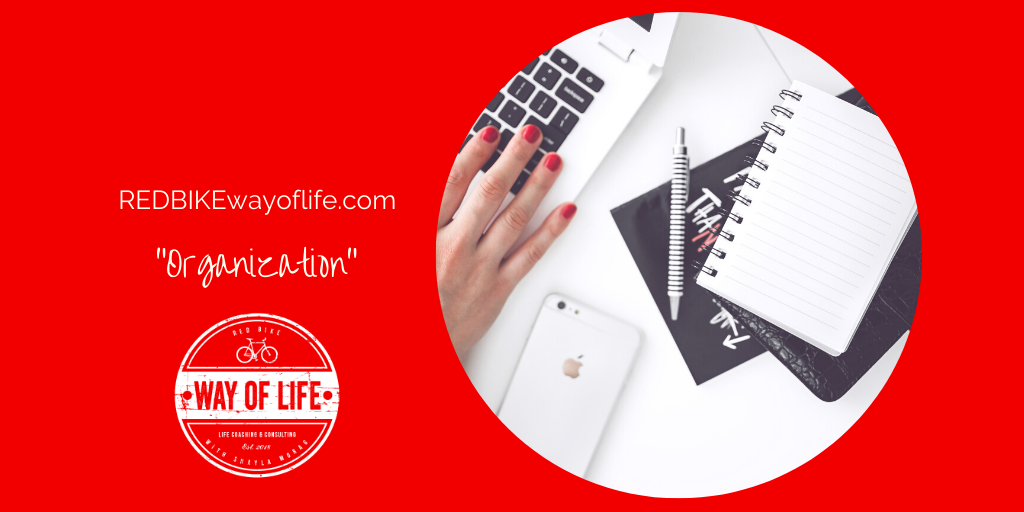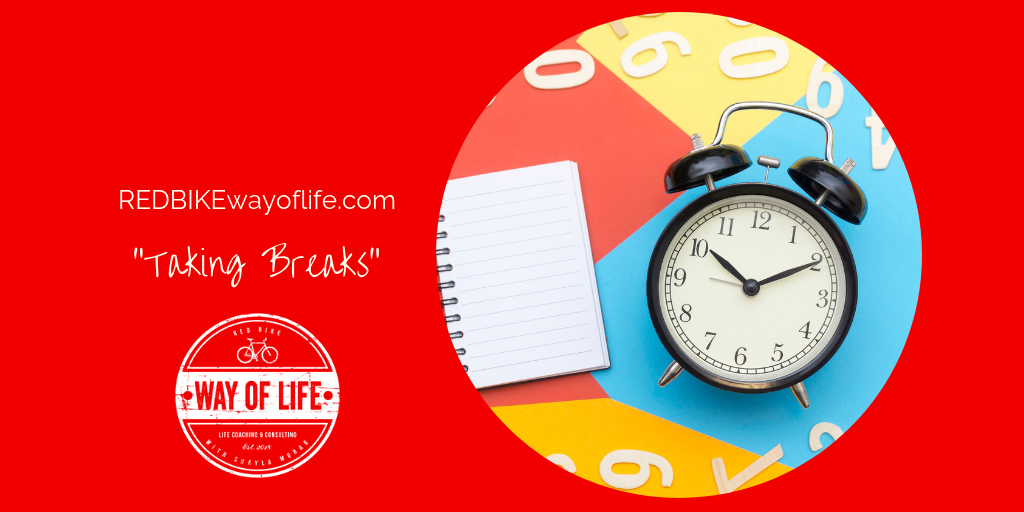
by Shayla Morag | Nov 15, 2019 | Balance, Cutting Clutter, Professional Organizing, Stress Management, The Red Bike Way
We know it to be true. An organized space just feels better. The mind seems calmer and dealing with life a lot more doable. Goals seem easiest to reach and everyday mundane tasks not such a drudgery. Professional organizing is a helpful service which I am now offering clients. When I would talk to clients about striving for a dream, the conversation quite often revolved around the feeling of just being overwhelmed and stuck due to having too much “stuff” (material and emotional). I truly get it and have been on my own personal journey of purging unwanted and unnecessary “stuff” to move forward and feel lighter for many years it seems.
Since I was young, I have been organizing rooms from head to toe. My Mom would go out for a meeting and return to a newly designed space. When I have gone through transitions, I tend to “shift” my environment as well. I love the feeling of starting fresh. Friends who have been in my life for a long time always know that I have been through “something” by everything being flipped and rearranged.
Keep connected for more details about #theREDBIKEway Method of Professional Organizing. More to come!

by Shayla Morag | Jun 18, 2019 | Balance, Meditation, Mindfulness, Self Care, Stress Management, The Red Bike Way
The Western world views breaks as a tool to promote laziness. But your effectiveness and efficiency will improve if you take regular breaks. You can work more intently and for more hours each day if you’ll give yourself a break at least once per hour. You won’t just get more done, you’ll be happier and less stressed, too.
Learn about the following 7 advantages of taking breaks:
1. You’ll get more done. Try a little experiment at work. First, spend a day attempting to do nothing but work for the entire day and note how much you accomplish. The following day, focus on your work for 30 minutes and then take a 5-minute break. Notice how much more you accomplish.
This applies to physical activities as well. Studies have shown the average marathon runners actually complete the race faster and more comfortably if they take regular walking breaks of up to a mile each.
2. You’ll feel much better at the end of the day. While performing the previous experiment, notice how you feel physically and mentally at the end of the day. You’ll feel nearly as good at the end of the day as you did at the beginning if you take breaks. Without breaks, you’ll feel exhausted.
3. The quality of your work is improved. The ability to focus is limited. Your mind begins to wander at some point. The quality of your work is compromised when your focus begins to wane.
Taking regular breaks is an effective way to ensure the quality of your work doesn’t suffer.
4. Breaks provide opportunities for evaluation. It’s important to regularly assess if you’re working effectively. If you put your head down and never look up, you can find yourself lost in the weeds. A break is an opportunity to re-evaluate the situation.
5. Taking a break can lower your stress. It’s important to intermittently disengage from any activity that causes stress. Your ability to work is compromised as your stress rises beyond a certain level
6. Breaks help to prevent boredom. Studies suggest that it’s more effective to regularly disengage and reengage with goals rather than focusing on them for long periods of time. The same idea applies to your work. Avoid spending too much time on one task before taking a break. You’ll maintain a higher level of interest in your work.
7. You can use your breaks to get other things done. Imagine how much you can accomplish with 8 or more 10-minute breaks each day. You could spend those 10 minutes performing an exercise or two, meditating, staying in contact with friends and family, tidying up, paying bills, or practicing the violin.
A break is a change in activity. Breaks don’t have to be spent daydreaming, though that’s not a bad way to spend a break.
You might be wondering how long a break should be and how frequently they should be taken. Science has an answer. For most people, the ideal break schedule is a 5-minute break every 30 minutes or a 10-minute break every 60 minutes. It can also be helpful to take a longer break every 2-3 hours.
Try a few different schedules and see what works for you. As a general rule, tasks that require more brainpower or muscle power require more frequent breaks.
Breaks are enjoyable way to add hours to your day. Your output will increase and you’ll also enjoy your free time more since you won’t be exhausted. Give yourself a break today and enjoy the many benefits taking regular breaks provides.

by Shayla Morag | May 14, 2019 | Balance, Handy Tips, Self Care, Stress Management, The Red Bike Way
Do you have so much going on that you feel overwhelmed? A busy life with too many demands can lead to feeling overwhelmed and stressed. Work, family, and other obligations can prove to be too much at times. Working even harder to rectify the situation seems unreasonable when you feel as if you’re already working at full capacity.
Just remember that you’ve felt overwhelmed in the past and made it through to the other side. Things get better.
Minimize your feelings of overwhelm and stress with these 10 strategies:
1. Take a deep breath. Once you start to feel overwhelmed, things tend to go downhill quickly. Give yourself a break by relaxing, taking a deep breath, and slowing down your brain. Scan your environment and describe it to yourself. It will disengage your mind from your stressors and bring it back to reality.
2. Focus on what you can do. In any situation, there are things you can control and things you can’t control. Keep your focus on those things within your influence.
3. Let go of those things that are out of your control. There’s no reason to think about it and get yourself more agitated if you can’t do anything about it. Learn to let go of anything you can’t influence.
4. Focus on solutions. Most of us make the mistake of focusing on the problem and imagining negative outcomes. This strategy decreases your capability and causes even more stress. If you’re going to put your brain to work, use it to find the best possible solution!
Ask yourself what you can do to eliminate or lessen the sources of your stress. Write down your ideas.
5. Avoid making assumptions. Are things actually as stressful as you think they are? Is it possible that you’ve misinterpreted the facts or made poor assumptions? Gather all the facts before deciding if there’s a reason to be overwhelmed. Question your judgment and ensure that you’re on solid ground before hitting the panic button
6. Give yourself a change of scenery. Get out of the house and the office for a few hours. Your environment affects your perspective. Spend some time in nature if possible.
7. Spend time with a friend. Go out for pizza and movie with a good friend. Rely on those in your social circle for advice, comfort, and a quick distraction. Which of your friends is best at making you feel better?
8. Take part in a relaxing activity. What relaxes you? Lying on the couch with your headphones? Going for a run? Getting a massage? Spend an hour or two decompressing and you’ll feel better.
9. Cut down on your obligations. Maybe you’re trying to do too much. Consider limiting the number of activities you participate in. Are you taking on too many responsibilities at work?
Consider which of your obligations are most important and get rid of the rest.
10. Remember when you’ve been overwhelmed in the past. You survived. In fact, you might even laugh today about how stressed you were back then. Hindsight is 20-20. Consider that you’re likely to feel the same way in the future regarding your current situation.
Slow your mind and take a deep breath when first faced with feelings of overwhelm. Try to maintain an objective perspective. It’s easy to get carried away when you’re feeling stressed! Take a timeout and make a list of the items you can control. Search for solutions that address those items.
Let go of those items you can’t control. Rely on friends and family to help you cope, since you’d do the same for them.

by Shayla Morag | Jan 06, 2019 | Balance, Caregiving, Creativity, Self-Compassion, The Red Bike Way
Creativity
is the ability to make something new or to develop new ideas. Developing more
creativity can benefit your career, relationships, and hobbies. Children love
to be creative, but many adults have less motivation to create. There are also
many obstacles to creativity.
Stack the
deck in your favor by dealing intelligently with most the common barriers to
creativity:
Fear of
ridicule. As
they say, nothing ventured, nothing gained. No matter what you do, someone will
provide criticism. Learn to ignore the naysayers and let your creativity shine.
Fear of
failure. It can
be the fear of losing money or valuable time. Or it can be a simple fear of
failure. You’re tough enough to handle it. You’ve already failed thousands of
times in one way or another and you’ve survived. What would happen if you did
fail?
- Time and space energize creativity. It’s more challenging to come up with a brilliant idea if your kids are calling your name or your phone is chirping at you every 30 seconds. Schedule your creative time to minimize as many interruptions as possible. Early in the morning and later in the evening can be the best options for many.
- A distraction is an interruption you give yourself. How do you commonly waste time? Remove those distractions from your immediate environment. Put your cell phone on mute and throw it in the drawer. Turn off the TV. Focus 100% on your creative activity. Distractions are controllable. Have the self-discipline to control them.
Past
experiences. Your
past affects your current thinking and beliefs. Attempt to open your mind to
all the possibilities. Just because something didn’t work once in the past
doesn’t mean it can’t work today. Let go of the past and free your creativity.
Stopping
too soon. Once a good idea is found, it’s common to stop looking for a
better solution. Are you sure you’ve chosen the right color for your painting?
The right word for your novel? The right idea to make $10 million?
- Once you’ve found a good idea, keep looking for an even better one.
- Stress and creativity rarely go hand in hand. Whether it’s the stress of being tired, running out of time, financial issues, or illness, creativity is more challenging than when you’re relaxed. Find time to relax and decompress before starting a session of creativity. Your results will be enhanced.
Negative
moods. It’s not just stress.
Anger, jealousy, fear, impatience, sadness, or hopelessness can also be
barriers to creativity. Studies have shown that creativity tends to peak while
experiencing strong, positive moods.
- Do whatever is necessary to boost your mood before accessing your creativity. Take a walk, call a good friend, or listen to uplifting music. What makes you feel better when you’re in a bad mood?
Too many
options. It
can actually be easier to find your creative streak if you limit your choices.
Try to make a painting with only three colors. Write a short story with only
300 words. Or compose a song with only a few chords. Having too many choices
can be a challenge in itself. Try limiting your options if you’re stuck.
If you
can’t get your creative juices flowing, maybe something is in your way. Your
creativity is a significant part of your uniqueness. Avoid the common obstacles
to creativity and show the world what you have to offer. To really boost your
creativity, try using it regularly. And start today!

by Shayla Morag | Nov 23, 2018 | Balance, Caregiving, Health, Self-Compassion, The Red Bike Way
When caring for others, it can be easy to forget about our own needs. It may take more than an apple a day to keep the doctor away, but a healthy diet and other simple lifestyle changes can keep you from becoming ill. Learn how to develop habits that will keep you fit and strong.
Dietary Changes
Many experts blame the Standard American Diet (SAD) for high rates of obesity, diabetes, depression, and other serious conditions. Good nutrition can strengthen your immune system and lower your risk for many illnesses.
1. Eat more produce. Fruits and vegetables are nutrient dense and light in calories. They’ll boost your immune system and help you stay hydrated. Plus, all that fiber can lower your risk of diabetes.
2. Focus on whole foods. Processed foods are usually loaded with excessive fat, sugar, and salt. Try eating foods in their natural state.
3. Limit alcohol. Too many cocktails can damage your liver and other organs. Most experts recommend up to one drink a day for women and two for men.
4. Manage your weight. Carrying around too many pounds increases your risk of heart conditions, arthritis, and certain cancers. Stay slim by watching calories and leading an active life.
Other Lifestyle Changes
Here are a few more changes to go along with your balanced diet. They’ll have a major impact on your body and mind.
5. Move around. Physical activity strengthens your heart and muscles. Aim to exercise at least 3 days a week. Take the stairs instead of the elevator.
6. Sit less. Research suggests that the longer you sit, the poorer your health may be even if you exercise. If you have a desk job, try taking walking breaks every half hour. Cut back on your TV time.
7. Do yoga. While any form of exercise and relaxation can be beneficial, yoga seems especially powerful. A study at Massachusetts General Hospital recorded a whopping 43% reduction in healthcare use among patients who studied yoga for a year.
8. Deal with stress. If yoga is not your cup of tea, there are other ways to keep tension from piling up. Book a massage or listen to gentle music.
9. Be happy. The more you’re satisfied with your life, the less you’ll need your doctor. On a scale of 1 to 6, a patient could expect an 11% decrease in doctor visits for each level of higher life satisfaction, according to one University of Michigan study.
10. Adopt a pet. Holding your cat is good for mental and physical well being. The CDC says pets help people lower their blood pressure, cholesterol, and triglyceride levels. They also provide an antidote to loneliness.
11. Connect with others. Speaking of loneliness, support from humans helps too. Close social ties can help you catch fewer colds, and may even extend your life.
12. Sleep well. Adequate rest and sleep is vital to healing. Turn off the computer and TV in the evening and go to bed on time.
13. Quit smoking. Giving up tobacco may be the most important thing you can do for your health. It takes an average of 5 to 10 attempts to quit for good, so hang in there.






